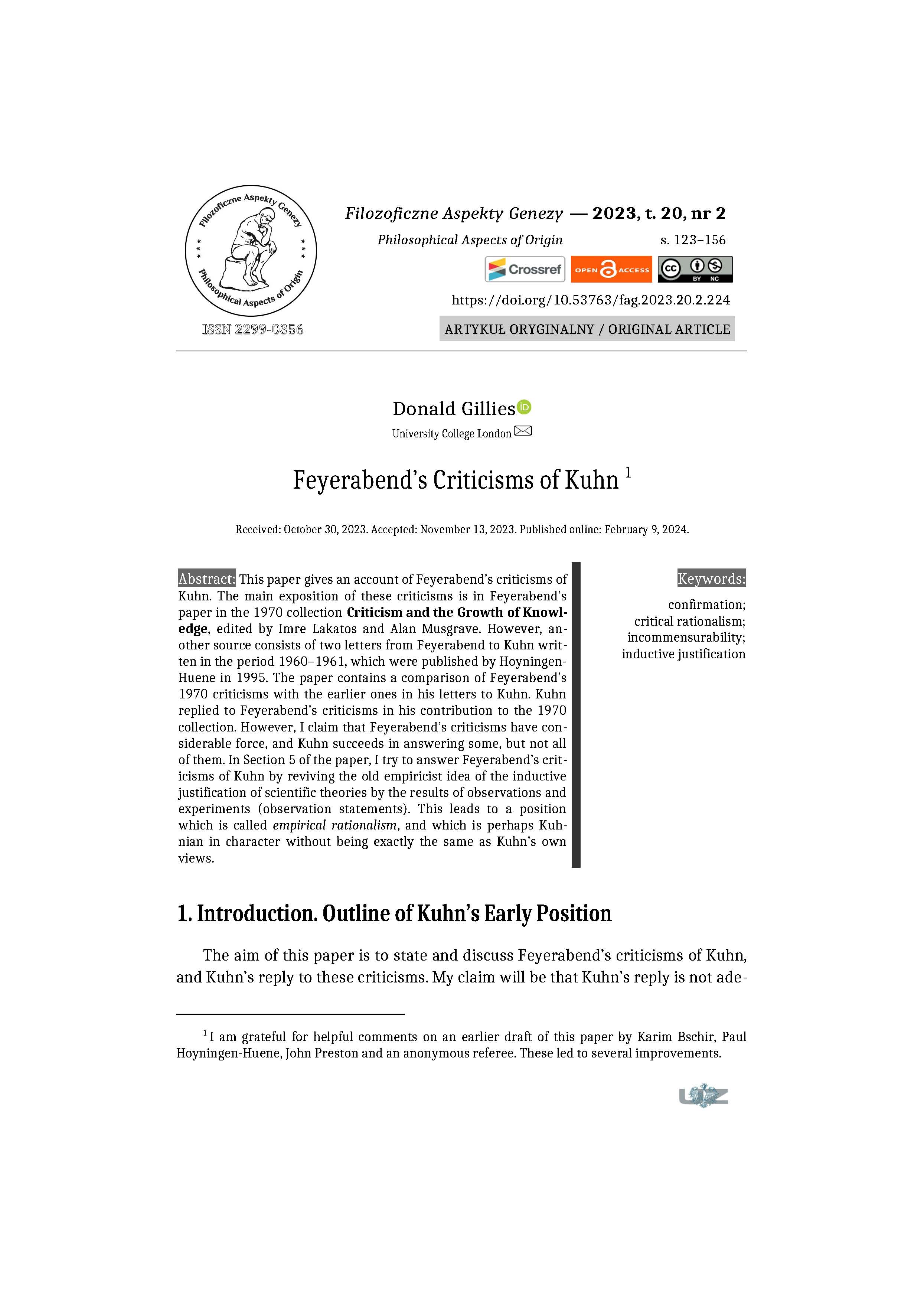
Opublikowane 09.02.2024 — zaktualizowane 28.05.2024
Wersje
- 28.05.2024 - (2)
- 09.02.2024 - (1)
Słowa kluczowe
- confirmation,
- critical rationalism,
- incommensurability,
- inductive justification
Prawa autorskie (c) 2023 Filozoficzne Aspekty Genezy

Utwór dostępny jest na licencji Creative Commons Uznanie autorstwa – Użycie niekomercyjne 4.0 Międzynarodowe.
Jak cytować
Abstrakt
This paper gives an account of Feyerabend’s criticisms of Kuhn. The main exposition of these criticisms is in Feyerabend’s paper in the 1970 collection Criticism and the Growth of Knowledge, edited by Imre Lakatos and Alan Musgrave. However, another source consists of two letters from Feyerabend to Kuhn written in the period 1960–1961, which were published by Hoyningen-Huene in 1995. The paper contains a comparison of Feyerabend’s 1970 criticisms with the earlier ones in his letters to Kuhn. Kuhn replied to Feyerabend’s criticisms in his contribution to the 1970 collection. However, I claim that Feyerabend’s criticisms have considerable force, and Kuhn succeeds in answering some, but not all of them. In Section 5 of the paper, I try to answer Feyerabend’s criticisms of Kuhn by reviving the old empiricist idea of the inductive justification of scientific theories by the results of observations and experiments (observation statements). This leads to a position which is called empirical rationalism, and which is perhaps Kuhnian in character without being exactly the same as Kuhn’s own views.
Downloads
Bibliografia
- Bschir Karim, Feyerabend and Popper on Theory Proliferation and Anomaly Import: On the Compatibility of Theoretical Pluralism and Critical Rationalism, HOPOS. The Journal of the International Society for the History of Philosophy of Science 2015, Vol. 5, No. 1(spring), pp. 24–55, https://doi.org/10.1086/680368.
- Carnap Rudolf, Logical Foundations of Probability, 2nd edition, University of Chicago Press, Chicago 1950.
- Collodel Matteo, Was Feyerabend a Popperian? Methodological Issues in the History of the Philosophy of Science, Studies in History and Philosophy of Science Part A 2016, Vol. 57, pp. 27–56.
- Feyerabend Paul K., Consolations for the Specialist, in: Imre Lakatos and Alan Musgrave (eds.), Criticism and the Growth of Knowledge, Vol. 4, Cambridge University Press 1970, London — New York, pp. 197–230.
- Feyerabend Paul K., Against Method: Outline of an Anarchist Theory of Knowledge, New Left Books, London 1975.
- Feyerabend Paul K., Killing Time: The Autobiography of Paul Feyerabend, Chicago University Press, Chicago 1995.
- Gillies Donald, Confirmation Theory, in: Dov M. Gabbay and Philippe Smets (eds.), Handbook of Defeasible Reasoning and Uncertainty Management Systems, Quantified Representation of Uncertainty and Imprecision, Vol. 7, Kluwer, Dordrecht — London 1998, pp. 135–167.
- Gillies Donald, Problem-Solving and the Problem of Induction, in: Zuzana Parusniková and Robert S. Cohen (eds.), Rethinking Popper, Boston Studies in the Philosophy of Science, Vol. 272, Springer, Dordrecht 2009, pp. 103–115, https://doi.org/10.1007/978-1-4020-9338-8.
- Hoyningen-Huene Paul, Two Letters of Paul Feyerabend to Thomas S. Kuhn on a Draft of The Structure of Scientific Revolutions, Studies in History and Philosophy of Science Part A 1995, Vol. 26, No. 3, pp. 353–387, https://doi.org/10.1016/0039-3681(95)00005-8.
- Hoyningen-Huene Paul,Paul Feyerabend and Thomas Kuhn, in: John Preston, Gonzalo Munévar, and David Lamb (eds.), The Worst Enemy of Science? Essays in Memory of Paul Feyerabend, Oxford University Press, New York — Oxford 2000, pp. 102–114.
- Kuhn Thomas S., The Copernican Revolution: Planetary Astronomy in the Development of Western Thought, first edition in 1957, Vintage Books, Cambridge 1959.
- Kuhn Thomas S., The Essential Tension: Tradition and Innovation in Scientific Research, in: Thomas S. Kuhn (ed.), The Essential Tension: Selected Studies in Scientific Tradition and Change, University of Chicago Press, Chicago 1959, pp. 225–239.
- Kuhn Thomas S., The Structure of Scientific Revolutions, The University of Chicago Press, Chicago — London 1962.
- Kuhn Thomas S., Reflections on my Critics, in: Imre Lakatos and Alan Musgrave (eds.), Criticism and the Growth of Knowledge, Cambridge University Press, London 1970, pp. 231–278, https://doi.org/10.1017/CBO9781139171434.011.
- Kvasz Ladislav, On Classification of Scientific Revolutions, Journal for General Philosophy of Science 1999, Vol. 30, No. 2, pp. 201–232, https://tiny.pl/c8pn5 [15.09.2023].
- Lakatos Imre, Proofs and Refutations (I), The British Journal for the Philosophy of Science 1963, Vol. 14, No. 53, pp. 1–25.
- Lakatos Imre, Proofs and Refutations (II), The British Journal for the Philosophy of Science 1963, Vol. 14, No. 54, pp. 120–139.
- Lakatos Imre, Proofs and Refutations (III), The British Journal for the Philosophy of Science 1963, Vol. 14, No. 55, pp. 120–139.
- Lakatos Imre , Proofs and Refutations (IV), The British Journal for the Philosophy of Science 1964, Vol. 14, No. 56, pp. 296–342.
- Lakatos Imre, Criticism and the Methodology of Scientific Research Programmes, Proceedings of the Aristotelian Society, New Series 1968, Vol. 69, pp. 315–417.
- Lakatos Imre, Newton’s Effect on Scientific Standards, in: Imre Lakatos (ed.), The methodology of scientific research, Cambridge University Press, New York 1978a, pp. 193–222.
- Lakatos Imre, The Methodology of Scientific Research Programmes. Philosophical Papers Vol 1, edited by John Worrall and Gregory Currie, Cambridge University Press, Cambridge, New York, Port Chester, Melbourne, Sydney 1978, pp. 193–222.
- Imre Lakatos and Paul Feyerabend, For and Against Method. Including Lakatos’s Lectures on Scientific Method and the Lakatos-Feyerabend Correspondence, edited and with an Introduction by Matteo Motterlini, University of Chicago Press, Chicago 1999.
- Oberheim Eric, Feyerabend’s Philosophy, Quellen und Studien zur Philosophie, Vol. 73, Walter de Gruyter, Berlin 2006, https://doi.org/10.1515/9783110891768.
- Popper Karl R., The Logic of Scientific Discovery, 6th (revised) impression of the 1959 english translation, first edition 1934, Hutchinson, London 1972.
- Popper Karl R., The Aim of Science, in: Karl R. Popper, Objective Knowledge: An Evolutionary Approach, Oxford University Press, Oxford 1972, pp. 191–205.
- Popper Karl R., New Appendices, in: Karl R. Popper, The Logic of Scientific Discovery, 6th (revised) impression of the 1959 english translation, Hutchinson, London 1972, pp. 307–464.
- Popper Karl R., Normal Science and its Dangers, in: Imre Lakatos and Alan Musgrave (eds.), Criticism and the Growth of Knowledge, Vol. 4, Cambridge University Press 1970, London — New York, pp. 51–58.
- Popper Karl R., Objective Knowledge: An Evolutionary Approach, Oxford University Press, Oxford 1972.
- Preston Jonh, Feyerabend: Philosophy, Science and Society, Polity Press, Cambridge 1997.
- Sheehan Helena, Marxism and the Philosophy of Science: A Critical History, Humanities Press, Atlantic Highlands 1985.
- Watkins John W. N., Against »Normal Science«, in: Imre Lakatos and Alan Musgrave (eds.), Criticism and the Growth of Knowledge, Vol. 4, Cambridge University Press 1970, London — New York, pp. 25–37.


